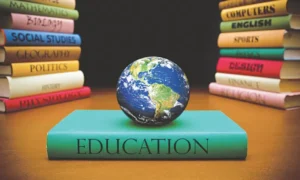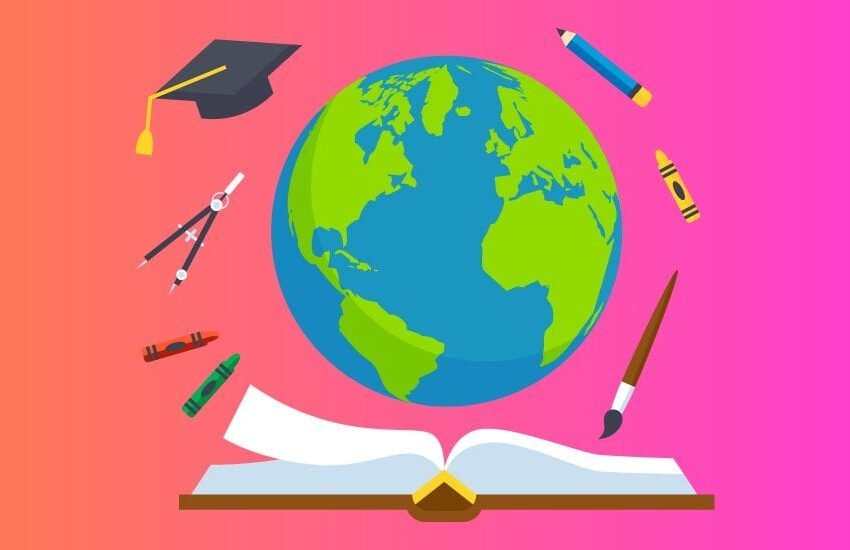The entwined strands of Education and Contributing to a Better World form the very core of societal evolution in the dynamic fabric of human progress. Education is the compass that leads people through the maze of information; the journey has purpose when people are committed to making the world a better place.
Enlightened cultures are based on this symbiotic link between kindness and learning. It is becoming more and more clear how important education is in promoting comprehension, empathy, and critical thinking as we work through the complexity of the modern world. It gives people the ability to actively change the world rather than just existing in it.
The revolutionary potential buried in the intersection of knowledge acquisition and the admirable goal of achieving communal well-being is explored in this investigation of the fundamental relationship between Education and Contributing to a Better World.

Fostering Global Citizenship: Education and Contributing to a Better World
Education has an unmistakable role as a catalyst for positive change in the complex fabric of human development. Education is more than just gaining information; it is the foundation for transforming people into responsible members of society. This essay examines the dynamic relationship between Education and Contributing to a Better World by diving into important principles, competencies, and concrete instances that highlight the transformational potential of a civilized society.
Knowledge’s Transformative Power
Education provides knowledge that cuts beyond boundaries, which paves the way for societal advancement. People with a broad and complete education are better able to comprehend and deal with the many problems that face humanity in today’s globalized society. Education and Contributing to a Better World are put into practice through this interconnection, which is not only theoretical.
Take international scientific research collaborations as an example. Global scientists work together to find solutions to urgent problems like climate change and health crises through knowledge sharing and educational exchanges. The global change that education brings about is propelled by the synergy it creates.
Skills and Values: Outside the Classroom
Education imparts principles and abilities that are essential for developing a feeling of social responsibility; it is not limited to textbooks and lectures. Education instills values such as empathy, integrity, and respect for variety, which help to shape people who are not only intellectually gifted but also socially aware.
Consider programs that integrate service-learning into academic curricula. Through practical community service activities, these programs help students develop empathy and a thorough awareness of societal problems. Individuals learn to apply their knowledge and abilities to real-world problems by actively participating in their communities, which is an example of the mutually beneficial relationship between Education and Contributing to a Better World.
Read Also: Purposes of Schooling
Changing Education to Meet Modern Difficulties
The world’s difficulties change with it. The pressing concerns of socioeconomic injustice, climate change, and global health demand that educational systems adapt. Is it possible for formal education systems to change to meet the changing needs of Contributing to a Better World?
Novel methods to education hold the key to the solution. Techniques that increase the relevance of education include technological integration, interdisciplinary studies, and project-based learning. For example, by taking students to various locations across the globe using virtual reality simulations, they can gain a firsthand grasp of other cultures and global challenges. Through the use of these adaptable strategies, education continues to be a dynamic force that prepares people to face and contribute to the changing challenges of our day.
Personal Agency: Using Education to Make a Difference
Individual actions also have an impact on Education and Contributing to a Better World, in addition to systemic ones. Every educated person has the agency to use their knowledge to effect constructive change both inside and outside of their communities.
Consider social entrepreneurship as an illustration. Those with education, who possess both the knowledge and abilities to effectively address the demands of society, frequently take the lead in developing long-term solutions. These people create companies that put social and environmental effect first, which improves the world both morally and commercially.
Excellent Teaching Methods
Even though education is a wide notion, some methods and initiatives stand out for being particularly successful at fostering a dedication to a better society. For example, global education efforts promote shared responsibility and cross-cultural understanding. Participating in these programs helps students see the world from a global perspective and understand their place as global citizens.
Education on the environment is another excellent strategy. The sense of environmental responsibility is ingrained, surpassing just academic understanding. Education and concrete contributions to a more sustainable world are directly linked through experiential learning initiatives like planting trees or reducing waste.
Read Also: The Schwarzman Scholars Programme 2024-2025
Group Prioritization: The Impact of Society on the Future
There must be a collective prioritizing of these ideas throughout society for Education and Contributing to a Better World to realize their full potential. Communities, companies, and governments all have a significant impact on how education is shaped.
Think about how policy decisions have a part. Funding for inclusive, high-quality education can be prioritized by governments to guarantee that it is available to everyone. Businesses and educational institutions can work together to develop internship programs and real-world experiences for students, helping them to bridge the gap between what they learn in the classroom and what they can do in the real world. Support and involvement from the community serve to further bolster society’s commitment to education as a tool for building a more humane and sustainable future.
A Joint Venture Toward Advancement
The complex dance that exists between Education and Contributing to a Better World depicts a group of people moving forward together. It is a voyage propelled by information, directed by moral principles, and strengthened by each person’s agency. We may increase education’s power to effect positive change in society by prioritizing it, implementing outstanding practices, and implementing adaptive education.
The transforming power of Education and Contributing to a Better society is demonstrated in every classroom, lecture hall, and community effort, forming a future in which enlightened people work together to create a more compassionate and sustainable society.
How does education help people become greater contributors to the world?
Education serves as a furnace for transforming people into responsible members of society. It offers a basis of information, critical thinking, and ethical comprehension. Education cultivates empathy and an ingrained sense of responsibility for the welfare of the global society by exposing students to a variety of viewpoints.
Education gives people a more comprehensive perspective on the world, which helps them deal with difficult social issues and take the initiative to create a better future. The transformative effect it has on producing caring, knowledgeable, and socially responsible people demonstrates the symbiotic relationship between Education and Contributing to a Better World.
Read Also: Creative Writing Courses | Details
What are the most important moral principles and competencies that education transmits to promote social responsibility?
Education develops the values and abilities necessary to promote a feeling of social responsibility in addition to imparting knowledge. Educational courses incorporate values like environmental stewardship, empathy, and inclusivity. Sharpened critical thinking and problem-solving abilities allow people to assess complicated problems and make significant contributions to the advancement of society.
Education also develops communication skills, which promote productive discussion and teamwork. Education instills a moral compass by highlighting the significance of making ethical decisions and directing people toward activities that are consistent with the ideas of improving the world.
Can formal education systems change to meet the new demands of making the world a better place?
The dynamic character of contemporary socioeconomic concerns demands that formal education systems be flexible. Acknowledging the crucial connection between Education and Contributing to a Better World, academic institutions are progressively incorporating multidisciplinary methods. Priorities such as social justice, sustainability, and global citizenship are rising.
Technology is also used to improve accessibility and customize educational programs to address current problems. Constant curriculum revisions and an emphasis on experiential learning guarantee that formal education changes to meet the demands of the modern world, giving people the information and abilities they need to make significant contributions to a better society.

How can people use their education to improve their communities and the world around them?
People with education are more equipped to actively contribute to constructive change. People who have a strong educational background are better prepared to support sustainable practices, take part in community projects, and fight for social justice. Education makes it easier to participate in international discussions and cooperative projects outside of one’s local community.
People can become change agents, impact policy, and encourage others to join the group effort of Contributing to a Better World by making the most of their education. Individual acts, guided by education, have a cumulative effect on the larger society environment that goes much beyond their own personal realms.
Which educational strategies or initiatives are better at fostering a commitment to a better world?
Instilling a commitment to a better world has been shown to be helpful through a variety of educational approaches and programs. Programs that combine community service and academic study, known as service-learning, offer practical experiences that foster empathy and understanding. Initiatives in global education promote intercultural understanding by highlighting shared responsibility and interconnectivity.
Programs for environmental education foster a sense of environmental care and ecological literacy. Furthermore, ethical concepts are included into education through values-based education models, providing a solid basis for a dedication to social well-being. The variety of strategies highlights how education may be tailored to provide experiences that individual students find meaningful and motivate them to make a commitment to Contributing to a Better World.
In order to build a more compassionate and sustainable world, how can society as a whole prioritize and support education?
A multifaceted approach is required to prioritize and promote Education and Contributing to a Better World on a societal level. Resource allocation and policy formation that promote inclusive and comprehensive education are mostly the responsibility of governments and lawmakers. Cooperation between corporations, communities, and educational institutions increases the relevance of education to real-world problems.
Public awareness campaigns mobilize support for educational projects by emphasizing the role that education plays in creating a sustainable and humane world. Furthermore, funding teacher preparation programs guarantees that instructors have the skills necessary to mentor and motivate the following generation of globally engaged, socially conscious people. By acknowledging education as the primary means of advancing society, people can work together to build a more humane and sustainable world.
Trust you found our article on Education and Contributing to a Better World helpful. Follow our website for more interesting articles.

